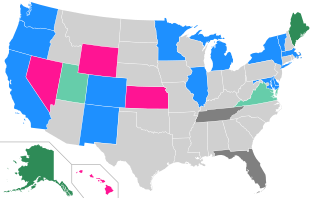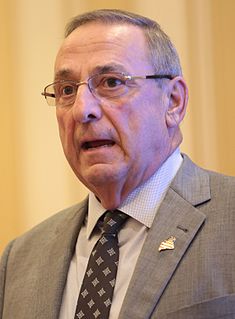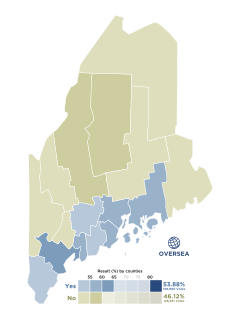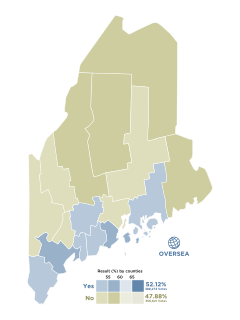Related Research Articles
In the politics of the United States, the process of initiatives and referendums allow citizens of many U.S. states to place new legislation, or to place legislation that has recently been passed by a legislature on a ballot for a popular vote. Initiatives and referendums, along with recall elections and popular primary elections, are signature reforms of the Progressive Era; they are written into several state constitutions, particularly in the West. It is a form of direct democracy.
Instant-runoff voting (IRV) is a voting method used in single-seat elections with more than two candidates. Instead of voting only for a single candidate, voters in IRV elections can rank the candidates in order of preference. Ballots are initially counted for each elector's top choice, losing candidates are eliminated, and ballots for losing candidates are redistributed until one candidate is the top remaining choice of a majority of the voters. When the field is reduced to two, it has become an "instant runoff" that allows a comparison of the top two candidates head-to-head.

A ballot proposition in the state of Arizona refers to any legislation brought before the voters of the state for approval.

Ranked-choice voting (RCV) is a ranked voting system being used in some states and cities in the United States in which voters may prioritize (rank) their choice of candidates among many, and a procedure exists to count lower ranked candidates if and after higher ranked candidates have been eliminated, usually in a succession of counting rounds. In practice, there are several ways this can be implemented and variations exist; instant-runoff voting (IRV) and single transferable vote (STV) are the general types of ranked-choice voting systems used in the United States.

Paul Richard LePage is an American politician who served as the 74th Governor of Maine from 2011 to 2019. A member of the Republican Party, LePage served two terms as a city councilor in Waterville, Maine, before being elected Mayor of Waterville in 2004, serving until 2011.

Maine Question 1 was a voter referendum conducted in Maine in 2009 that rejected a bill legalizing same-sex marriage in the state. The measure passed 53%–47% on November 3, 2009.
Maine Question 1 could refer to:

Maine Question 1 was a people's veto referendum that appeared on the June 12, 2018 statewide ballot. It sought to reject a law passed by the Maine Legislature that suspended the implementation of ranked choice voting, authorized by Maine voters in a previous referendum, for use in Maine elections until and if an amendment to the Maine Constitution is passed to expressly permit it; failing that, the law would be automatically repealed in 2021. It qualified because supporters of the original referendum collected the necessary number of signatures from registered Maine voters. This vote coincided with primary elections in which party nominees for governor, U.S. Senate, U.S. House, and the Maine Legislature were chosen through RCV to run in general elections on November 6.

Maine Question 5, formally An Act to Establish Ranked-Choice Voting, is a citizen-initiated referendum question that qualified for the Maine November 8, 2016 statewide ballot. It was approved by a vote of 52% in favor, 48% opposed. It sought to change how most Maine elections will be conducted from a plurality voting system to a ranked-choice voting system. It appeared on the ballot along with elections for President of the United States, Maine's two U.S. House seats, the legislature, five other ballot questions, and various local elections. The referendum was successful, making Maine the first state to use ranked choice voting for its federal elections.

Maine Question 4, formally An Act to Raise the Minimum Wage, is a citizen-initiated referendum question that appeared on the Maine November 8, 2016 statewide ballot. It sought to increase Maine's minimum wage from $7.50 per hour to $12 an hour by 2020, as well as increasing the minimum wage for tipped employees gradually to the same level by 2024. It would also index increases after 2024 to inflation. As the Maine Legislature and Governor Paul LePage declined to enact the proposal as written, it appeared on the ballot along with elections for President of the United States, Maine's two U.S. House seats, the Legislature, other statewide ballot questions, and various local elections. Efforts to place a competing, more moderate proposal alongside the citizen-initiated bill were unsuccessful.

Maine Question 2, formally An Act to Establish The Fund to Advance Public Kindergarten to Grade 12 Education, was a citizen-initiated referendum question that appeared on the Maine November 8, 2016 statewide ballot. It sought to increase state aid to public schools by instituting a surcharge of 3% on Maine income taxes for those with income above $200,000 a year. As the Maine Legislature and Governor Paul LePage declined to enact the proposal as written, it appeared on the ballot along with elections for President of the United States, Maine's two U.S. House seats, the Legislature, and various local elections.

Five referendums were held in Maine, United States on November 8, 2016 alongside state and national elections. All are citizen-initiated proposals, which cover:

Election results in Maine comprise voting for local, gubernatorial and federal public offices, members of the state legislature, as well as ballot measures. Congressional elections are held every even year, and gubernatorial ones every off-presidential even year.

Maine Question 2, formally entitled "An Act To Enhance Access to Affordable Health Care", was a citizen-initiated ballot measure that appeared on the November 7, 2017 statewide ballot in the State of Maine. Maine Question 2 sought to expand Medicaid eligibility under the terms of the Affordable Care Act. The measure passed.

Two referendums were held in Maine, United States on November 7, 2017 alongside state and national elections. All were citizen-initiated proposals, which cover:

The Fairness Project is a United States 501(c)(4) charitable organization created in October 2015. They promote general economic and social justice throughout the US by the use of ballot measures to circumvent deadlocks in law changes by the legislative and executive branches of government. They act as a national body by supporting state organizations and campaigns with targeted funding rather than by direct campaigning. They support the gathering of signatures to meet the variable requirements to trigger ballots in states and then aid the campaigns with early financial backing, strategic advice, and various campaign tools.

Maine Question 1 is a citizen-initiated referendum that appeared on the November 6, 2018 statewide ballot. It sought to implement a tax on higher incomes in Maine to fund in-home health care services for elderly and disabled Mainers, as well as to create a government board to administer the funds. The vote coincided with general elections for governor, U.S. Senate, U.S. House, the Maine Legislature, and other local elections. It qualified for the ballot due to supporters collecting signatures from registered Maine voters. It was defeated 62.86% to 37.14%.

2020 Maine Question 1 was a people's veto referendum that sought to reject a new law which eliminated religious and philosophical exemptions from school vaccination requirements and for employees of nursery schools and health care facilities. The question appeared on the March 3, 2020 statewide ballot.
Question 1 is the name of various ballot measures:
References
- ↑ Office of the Secretary of State of Maine, Tabulation of Votes
- ↑ "Here's how Maine's ballot question on universal home care will read". Portland Press Herald. June 25, 2018. Retrieved July 30, 2018.